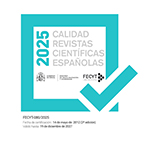Sustainable proposal to mitigate the adverse climatic effects in a coastal city of Argentina
Abstract
Sustainable climatic indicators are useful tools to complement urban land use planning and could be beneficial for the quality of life. In this study, it was designed an urban-climatic-indicator for Bahía Blanca city considering meteorological variables and perception analyses. It allows delimiting four urban regions. Then, a sustainable proposal was made in order to mitigate the adverse climatic effect from the application of DPSIR method. Results permitted considering that an early implementation of this proposal and the active participation of stakeholders and decision makers is needed to improve the current conditions of the city. With the measures proposed inhabitants know how to respond in case of the occurrence of various extreme meteorological events, discomfort conditions, etc. As a simple method, the methodology used in this study can be replicated in other cities worldwide with the aim of improving the quality of life of the inhabitants.Downloads
Article download
License
In order to support the global exchange of knowledge, the journal Anales de Geografía de la Universidad Complutense is allowing unrestricted access to its content as from its publication in this electronic edition, and as such it is an open-access journal. The originals published in this journal are the property of the Complutense University of Madrid and any reproduction thereof in full or in part must cite the source. All content is distributed under a Creative Commons Attribution 4.0 use and distribution licence (CC BY 4.0). This circumstance must be expressly stated in these terms where necessary. You can view the summary and the complete legal text of the licence.












